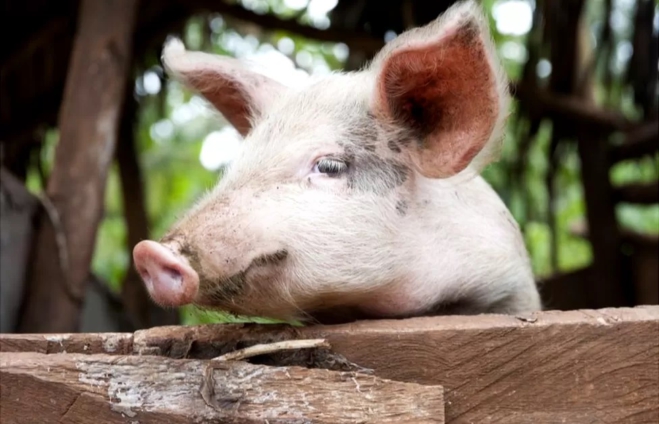
Audio By Carbonatix
Uganda's National Drug Authority has admitted it knew HIV medicine was being used to fatten up animals in 2014 but did not warn the public.
The regulator's senior drugs inspector Amos Atumanya told parliament it became aware anti-retrovirals were being given to pigs and chickens to treat them.
Mr Atumanya said that for humans, consuming small quantities of the drugs in food could be dangerous.
But the NDA has since tried to downplay his comments.
A spokesman said that if there was a health risk it would have warned the public, while the NDA's job was to regulate drugs not food or animal feed.
A recent report by the prestigious Makerere University found that more than a third of chicken and 50% of pork it tested contained traces of anti-retroviral drugs. The meat was sourced from markets in the capital, Kampala, and the northern city of Lira.
Appearing before Uganda's House Committee on HIV/Aids, Mr Atumanya said the National Drug Authority had carried out an investigation in 2014 into the use of anti-retrovirals (ARVs) in animal farming. However, while a report was published, it did not issue a public warning for fear of hurting the country's food exports "if we blow it out of proportion".
"So we were trying to find other means in which we could manage that situation," he said.
One respondent to the study by Makerere University's College of Health Sciences, said pigs that were given anti-retroviral drugs "grow faster and fatter and are sold off quickly".
But Mr Atumanya said this could cause serious problems for humans who ate the meat and became infected with HIV.
"You are likely to develop resistance to these ARVs," he said. "In the future if you need them, then you'll find this ARV is not working for some."
Around 1.4 million people in Uganda are living with HIV/Aids, according to the United Nations.
The NDA's report back in 2014, found that anti-retrovirals were mainly used to treat African swine fever which is also known as Pig Ebola and currently has no cure. It also verified claims that ARVs were being used to treat Newcastle disease in chicken.
Following Mr Atumanya's remarks, however, a spokesman for the NDA defended its decision to not publicise its findings.
"The NDA is mandated to regulate the drugs, not food or animal feeds," he said.
"If there was any public health threat concerning the drugs under the use, NDA will be the first one to come out and warn the public as we always do.
"The NDA remains vigilant and committed to ensuring that Ugandans have access to safe, efficacious and quality medicines."
He added that the regulator had launched several actions to stop the misuse of drugs, which led to several arrests and prosecution.
Latest Stories
-
Noise does not win elections; message matters—Mensah-Bonsu
7 minutes -
US-based Ghanaian lawyer cautions on embassy protest, says it could help Ken Ofori-Atta’s case
7 minutes -
Cocoa farmers claim months of unpaid produce; COCOBOD denies responsibility
7 minutes -
Asikuma accident victims laid to rest at Asuopri
10 minutes -
Black Stars forward Mohammed Fuseini makes Champions League debut against Bayern Munich
13 minutes -
Mahama calls for Africa-led development at World Economic Forum
14 minutes -
U.S. Immigration lawyer breaks down Ofori-Atta’s hearing, urges public understanding of legal complexities
15 minutes -
CEMSE: NPA’s price floor undermines market efficiency, kills competition and hurts consumers
16 minutes -
Africa must invest in skills, unity and industry or risk being left behind – Mahama
19 minutes -
Mahama calls for equal global partnership at World Economic Forum
22 minutes -
Roads of Peril: Commuters along Pokuase-Mayera stretch appeal to gov’t to fix terrible road network
22 minutes -
New cohort of Ghanaian youth begins precision quality TM internship in Accra and Tamale
47 minutes -
Vice President calls for stronger collaboration to drive governance, development
48 minutes -
Jema Task Force and forestry officers dismantle mining cell in Tano-Boin Reserve
1 hour -
‘Sua Nyansa’ movement takes on inflated evening transport fares in Kumasi
1 hour

